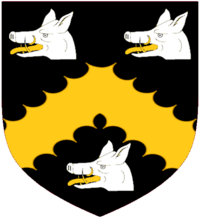William Whitelaw
[4] After the Conservative Party won an unexpected victory at the 1970 general election, Whitelaw was appointed as Leader of the House of Commons and Lord President of the Council by Prime Minister Edward Heath.[6] He never met his father, William Alexander Whitelaw, born 1892, a member of a Scottish family of the landed gentry,[7][8] who died in 1919 after service in the Argyll and Sutherland Highlanders in the First World War, when his son was still a baby.Whitelaw was brought up by his mother, Helen, a daughter of Major General Francis Russell,[8] MP for Cheltenham and a military attaché, and his paternal grandfather William Whitelaw (1868–1946), of Gartshore, Dunbartonshire, an Old Harrovian who had been educated at Trinity College, Cambridge,[9] a landowner, briefly Conservative MP for Perth, 1892–1895, and chairman of the London and North-Eastern Railway Company.He was awarded the Military Cross for his actions at Caumont; a photograph of Field Marshal Bernard Montgomery pinning the medal to his chest appears in his memoirs.Instead he was posted to Palestine, before leaving the army in 1946 to take care of the family estates of Gartshore and Woodhall in Lanarkshire, which he inherited on the death of his grandfather.[14] When the Conservatives returned to power in 1970 under Edward Heath, Whitelaw was made Lord President of the Council and Leader of the House of Commons, with a seat in the cabinet.As a briefing for prime minister Heath later noted, Whitelaw "found the experience of meeting and talking to Mr Mac Stíofáin very unpleasant".[16] In 1973, Whitelaw left Northern Ireland—shortly before the Sunningdale Agreement was reached—to become Secretary of State for Employment, and confronted the National Union of Mineworkers over its pay demands.His much vaunted "short, sharp shock" policy, whereby convicted young offenders were detained in secure units and subjected to quasi-military discipline, won approval from the public but proved expensive to implement.[25] Inner city decay, unemployment and what was perceived at the time as heavy-handed policing of ethnic minorities (notably the application of what some called the "notorious" sus law) sparked major riots in London, Liverpool, Birmingham and Leeds, and a spate of disturbances elsewhere.[28] He chaired the "star chamber" committee that settled the annual disputes between the limited resources made available by Treasury and the spending demands of other government departments.Nicholas Ridley argued that Whitelaw's retirement marked the beginning of the end of the Thatcher premiership, as he was no longer around as often to give sensible advice and to moderate her stance on issues, or to maintain a consensus of support in her own Cabinet and parliamentary party.


William Whitelaw (disambiguation)The Right HonourableDeputy Prime Minister of the United KingdomDe factoMargaret ThatcherRab ButlerGeoffrey HoweLord President of the CouncilJohn BiffenJohn WakehamEdward HeathFred PeartRobert CarrLeader of the House of LordsThe Baroness YoungThe Baron BelsteadHome SecretaryMerlyn ReesLeon BrittanDeputy Leader of the Conservative PartyJohn MajorReginald MaudlingPeter LilleySecretary of State for EmploymentMaurice MacmillanMichael FootSecretary of State for Northern IrelandFrancis PymLeader of the House of CommonsChairman of the Conservative PartyPeter CaringtonPeter ThorneycroftChief Whip of the Conservative PartySir Alec Douglas-HomeMartin RedmayneParliamentary Secretary to the Ministry of LabourElizabeth IIHarold MacmillanAlec Douglas-HomeAlan GreenLord Commissioner of the TreasuryPaul BryanGordon CampbellShadow CabinetShadow Home SecretaryIan GilmourMember of the House of LordsMember of ParliamentPenrith and The BorderDonald ScottDavid MacleanEdinburghBlencowConservativeCecilia SprotAlma materTrinity College, CambridgeUnited KingdomBritish ArmyScots GuardsWorld War IIConservative Party1970 general electionStormont Parliamentdirect ruledeputy party leader1983 general electionThe Royal and Ancient Golf Club of St Andrewslanded gentryArgyll and Sutherland HighlandersFirst World WarMajor GeneralFrancis RussellWilliam WhitelawOld HarrovianLondon and North-Eastern Railway CompanyPrime MinisterBenjamin DisraeliWixenford SchoolWinchester CollegeOfficer Training CorpsSecond World Warcommission6th Guards Tank BrigadeGuards Armoured DivisionChurchill tanksNormandyOperation BluecoatJagdpantherNetherlandsMilitary CrossField MarshalBernard MontgomeryPacific WarPalestineLanarkshireEast Dunbartonshire1955 general electionLord of the TreasuryChief WhipPrivy CouncilSpecial Category StatusProvisional Irish Republican ArmySeán Mac StiofáinSunningdale AgreementNational Union of MineworkersFebruary 1974 general electionMember of the Order of the Companions of HonourHarold WilsonOctober 1974 general electionleadership election in 19751979 general electionDeputy Prime MinisterCabinet SecretaryRobert ArmstrongBrighton hotel bombingshort, sharp shockIranian Embassy siegeWolverhamptonNational FrontInner cityethnic minoritiessus lawmajor riotsProvisional IRAhereditary peerage